7 Pooja Mistakes That Attract Negativity
Noopur Kumari | Apr 29, 2025, 19:20 IST
( Image credit : Pexels )
Are your daily pooja rituals truly blessing your home—or unknowingly inviting bad luck? Most of us perform pooja with full faith, but hidden mistakes rooted in tradition could be silently blocking peace, prosperity, and divine energy. Discover 7 shocking blunders even the most devoted miss. This article will open your eyes and reconnect you with rituals the right way.
यथा चित्तं तथा वाणी, यथा वाणी तथा क्रिया।
यथा क्रिया तथा फलम्, यथा फलम् तथा जीवनम्।"
As is the mind, so is the speech; as is the speech, so are the actions. As are the actions, so is the result; and so is life.
We clean our houses, light diyas, present flowers, and recite mantras, yet we still question why there isn't more tranquillity, why wealth seems to come slowly, or why conflict persists in the house. Is it possible that we're unwittingly making a mistake in our devotion?
In Indian homes, pooja is a holy bond between the devotee and the divine rather than merely a ritual. But when done wrong, it can turn into a source of bad energy instead of good. Many of these errors have their roots in long-forgotten traditions that have been lost to contemporary routines but have been passed down through the generations. This article uncovers 7 rare but real pooja blunders that may be inviting negativity into your life—and how to fix them with faith and simplicity. Trust us, most people don’t even realise these errors exist.

Hinduism's most revered plant, tulsi, is considered a living goddess in addition to being a symbol of devotion. However, did you know that it is unlucky to pluck her leaves on Sundays, Ekadashi, or after sunset? During these moments, many people unintentionally offer Tulsi leaves, believing that good intentions suffice. However, ancient texts tenderly warn us that Tulsi Maa rests on Ekadashi and that upsetting her could cause a spiritual imbalance in your home. Understanding her heavenly rhythm is just as important to true devotion as making offerings. She will provide calm and purity in your house if you honor her holy pause.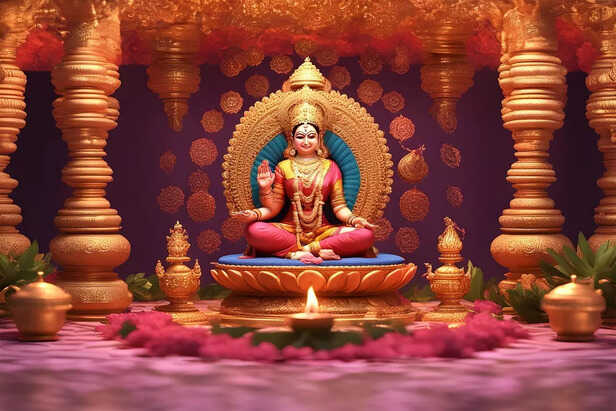
Lighting a diya is a spiritual moment and a silent dialogue with the Divine, not merely a routine. However, did you realize that your fate can be shaped by the direction you choose? A diya facing east bestows health and harmony on your home, while one facing north attracts wealth and fortune. But take caution—since the south is the direction of Yama, the god of death, it is said to draw bad luck. Such tremendous force may be contained in something so tiny. Therefore, when you light a diya the next time, allow it to do more than just shine; it should lead, shield, and uplift your soul in the proper direction.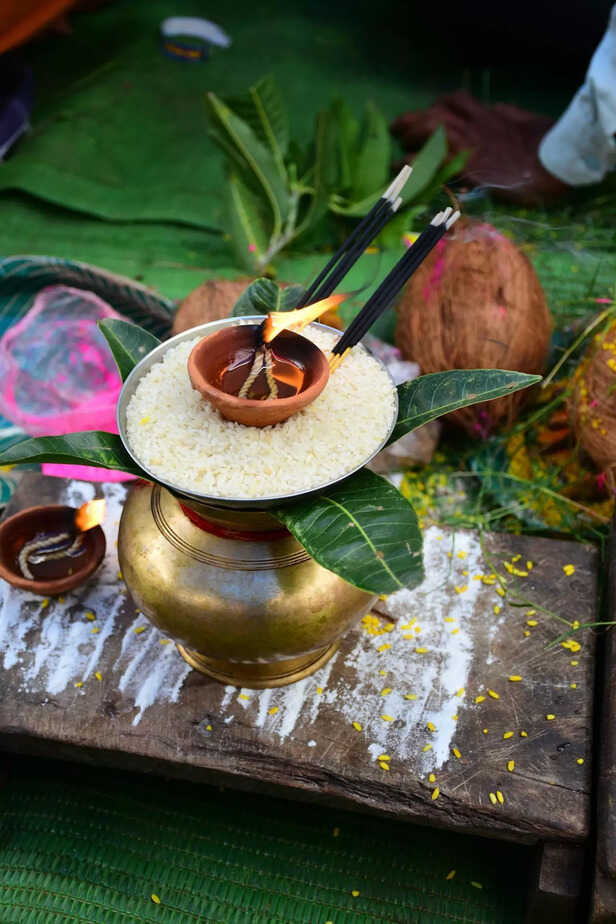
Unbroken rice, or akshata, is more than just a ceremonial object; it is a representation of completeness, innocence, and divine favour. However, a lot of people use leftover or broken grains during pooja without realising the silent message they are sending to the universe. Broken relationships, unrealized aspirations, or a life that feels stuck can result from incomplete grains, which can represent incomplete energy. Every grain you donate conveys your silent prayer, and rituals are reflections of intention. Like the life you want to build, let your offers be complete. Because the universe multiplies your promise of fullness by a hundred. Select completeness. Select a sacred intention.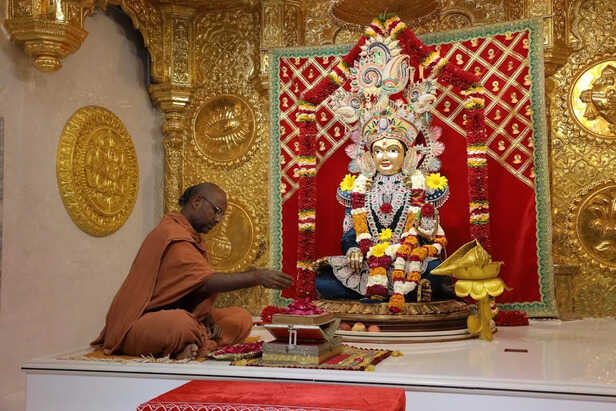
Many people recite mantras in their pajamas or without taking a bath in the hustle of today, yet traditional knowledge suggests differently. Our bodies are hallowed spaces, and purity is an energetic alignment rather than only a ritual. Being divine vibrations, mantras require a clear, unobstructed path to freely flow through. That divine force is blocked by static created by an unbathed body, greasy hair, or dirty clothing. Your body turns into a live antenna that connects to the universe, particularly around sunrise and sunset. You are clear in spirit and prepared to receive the gifts of the universe when your body is clean. Don't allow haste to erode your spiritual bond. Chant with your soul open, aligned, and cleansed.
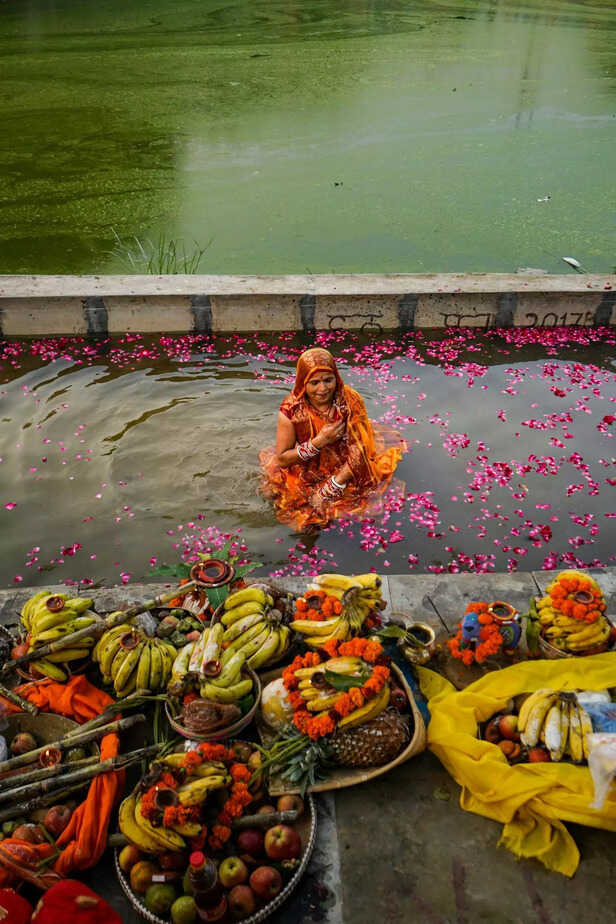
The majority of poojas nowadays take place in the background of buzzing phones, loud TVs, and cooking noise. However, this cacophony is spiritual pollution rather than only a distraction. The ancient seers were aware that the divine does not appear in chaos but rather in silence. Because of this, customary rites were carried out in quiet silence, accompanied only by the revered sound of a conch or the gentle chime of bells. These are calls to the supernatural, not only sounds. During aarti, even light conversation might disrupt the sacred energy flow. We must make the environment that the almighty honors serene, pure, and full of silent awe if we are to genuinely experience its presence.
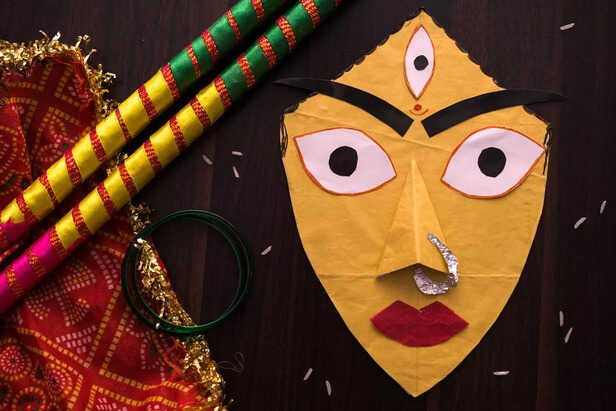
Out of love and attachment, many of us hold on to old, chipped, or broken idols in our home temples. But what we often overlook is that in Vastu and ancient Shastras, this act can unknowingly invite negativity. An idol is not just a statue—it’s a sacred embodiment of divine energy. When it's damaged, it no longer radiates the full grace it once did. Instead, it reflects broken energy, silently creating cracks in the peace and prosperity of your home. Letting go with respect isn't disrespect—it's a way of making space for whole, harmonious blessings to flow again.
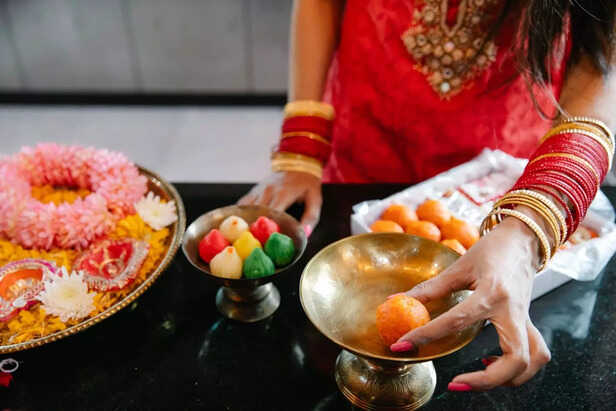
Although serving prasad produced from leftovers or food that has already been tasted may appear innocuous, it subtly denigrates the divine. Only fresh, pure, and lovingly prepared food is accepted by the gods. Bhog loses its divine aura when it is served cold or stale; it becomes tamasic and attracts negativity rather than grace. Prasad is more than just food; it is a sincere sacrifice that serves as a conduit between the divine and humanity. The blessing is absent when love and purity are absent. We must not allow ignorance to rob us of our commitment. Only present what you would personally serve a god: something new, undamaged, and brimming with affection. Miracles then take place.
Pooja is about a genuine connection, not perfect routines. However, even the best intentions can be undermined when traditional knowledge is ignored. We unwittingly invite chaos where there was once tranquillity when we strive for perfection and lose sight of the beauty in simplicity. These ancient customs are holy keys to connecting with heavenly energy, not blind traditions. These are spiritual sciences that have been handed down through the ages and are deeply ingrained in Indian culture. Correcting a single minor error can occasionally change your entire vibe and restore clarity, tranquillity, and optimism to your life. Remembering what your spirit already knows is time.
जब श्रद्धा में ज्ञान और नियम का मेल होता है,
तभी पूजा फल देती है – नहीं तो वो सिर्फ़ एक आदत बन जाती है।"
When faith is supported by knowledge and discipline, only then does pooja bear fruit—otherwise, it remains just a habit.
Explore the latest trends and tips in Health & Fitness, Travel, Life Hacks, Fashion & Beauty, and Relationships at Times Life!
यथा क्रिया तथा फलम्, यथा फलम् तथा जीवनम्।"
As is the mind, so is the speech; as is the speech, so are the actions. As are the actions, so is the result; and so is life.
We clean our houses, light diyas, present flowers, and recite mantras, yet we still question why there isn't more tranquillity, why wealth seems to come slowly, or why conflict persists in the house. Is it possible that we're unwittingly making a mistake in our devotion?
In Indian homes, pooja is a holy bond between the devotee and the divine rather than merely a ritual. But when done wrong, it can turn into a source of bad energy instead of good. Many of these errors have their roots in long-forgotten traditions that have been lost to contemporary routines but have been passed down through the generations. This article uncovers 7 rare but real pooja blunders that may be inviting negativity into your life—and how to fix them with faith and simplicity. Trust us, most people don’t even realise these errors exist.
1. Using Tulsi Leaves at the Wrong Time

tulsi,
( Image credit : Pixabay )
Hinduism's most revered plant, tulsi, is considered a living goddess in addition to being a symbol of devotion. However, did you know that it is unlucky to pluck her leaves on Sundays, Ekadashi, or after sunset? During these moments, many people unintentionally offer Tulsi leaves, believing that good intentions suffice. However, ancient texts tenderly warn us that Tulsi Maa rests on Ekadashi and that upsetting her could cause a spiritual imbalance in your home. Understanding her heavenly rhythm is just as important to true devotion as making offerings. She will provide calm and purity in your house if you honor her holy pause.
2. Ignoring the Direction of Your Diya

god
( Image credit : Pixabay )
Lighting a diya is a spiritual moment and a silent dialogue with the Divine, not merely a routine. However, did you realize that your fate can be shaped by the direction you choose? A diya facing east bestows health and harmony on your home, while one facing north attracts wealth and fortune. But take caution—since the south is the direction of Yama, the god of death, it is said to draw bad luck. Such tremendous force may be contained in something so tiny. Therefore, when you light a diya the next time, allow it to do more than just shine; it should lead, shield, and uplift your soul in the proper direction.
3. Offering Broken Rice or Cracked Grains

Unbroken rice, or akshata
( Image credit : Pixabay )
Unbroken rice, or akshata, is more than just a ceremonial object; it is a representation of completeness, innocence, and divine favour. However, a lot of people use leftover or broken grains during pooja without realising the silent message they are sending to the universe. Broken relationships, unrealized aspirations, or a life that feels stuck can result from incomplete grains, which can represent incomplete energy. Every grain you donate conveys your silent prayer, and rituals are reflections of intention. Like the life you want to build, let your offers be complete. Because the universe multiplies your promise of fullness by a hundred. Select completeness. Select a sacred intention.
4. Chanting Without a Bath or in Wrong Clothing

pooja
( Image credit : Pixabay )
Many people recite mantras in their pajamas or without taking a bath in the hustle of today, yet traditional knowledge suggests differently. Our bodies are hallowed spaces, and purity is an energetic alignment rather than only a ritual. Being divine vibrations, mantras require a clear, unobstructed path to freely flow through. That divine force is blocked by static created by an unbathed body, greasy hair, or dirty clothing. Your body turns into a live antenna that connects to the universe, particularly around sunrise and sunset. You are clear in spirit and prepared to receive the gifts of the universe when your body is clean. Don't allow haste to erode your spiritual bond. Chant with your soul open, aligned, and cleansed.
5. Ignoring the Importance of Sound Silence

poojas
( Image credit : Pixabay )
The majority of poojas nowadays take place in the background of buzzing phones, loud TVs, and cooking noise. However, this cacophony is spiritual pollution rather than only a distraction. The ancient seers were aware that the divine does not appear in chaos but rather in silence. Because of this, customary rites were carried out in quiet silence, accompanied only by the revered sound of a conch or the gentle chime of bells. These are calls to the supernatural, not only sounds. During aarti, even light conversation might disrupt the sacred energy flow. We must make the environment that the almighty honors serene, pure, and full of silent awe if we are to genuinely experience its presence.
6. Keeping Idle or Chipped Idols at Home

home temples.
( Image credit : Pixabay )
Out of love and attachment, many of us hold on to old, chipped, or broken idols in our home temples. But what we often overlook is that in Vastu and ancient Shastras, this act can unknowingly invite negativity. An idol is not just a statue—it’s a sacred embodiment of divine energy. When it's damaged, it no longer radiates the full grace it once did. Instead, it reflects broken energy, silently creating cracks in the peace and prosperity of your home. Letting go with respect isn't disrespect—it's a way of making space for whole, harmonious blessings to flow again.
7. Offering Food That’s Tasted or Stored in the Fridge

Offering Food pooja
( Image credit : Pixabay )
Although serving prasad produced from leftovers or food that has already been tasted may appear innocuous, it subtly denigrates the divine. Only fresh, pure, and lovingly prepared food is accepted by the gods. Bhog loses its divine aura when it is served cold or stale; it becomes tamasic and attracts negativity rather than grace. Prasad is more than just food; it is a sincere sacrifice that serves as a conduit between the divine and humanity. The blessing is absent when love and purity are absent. We must not allow ignorance to rob us of our commitment. Only present what you would personally serve a god: something new, undamaged, and brimming with affection. Miracles then take place.
What You Offer Reflects Who You Are
जब श्रद्धा में ज्ञान और नियम का मेल होता है,
तभी पूजा फल देती है – नहीं तो वो सिर्फ़ एक आदत बन जाती है।"
When faith is supported by knowledge and discipline, only then does pooja bear fruit—otherwise, it remains just a habit.
Explore the latest trends and tips in Health & Fitness, Travel, Life Hacks, Fashion & Beauty, and Relationships at Times Life!
